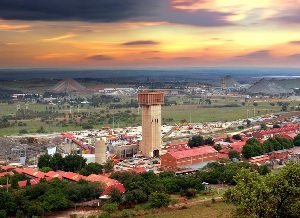
[miningmx.com] – A STRIKE over wages by the Association of Mineworkers & Construction Union (AMCU) at gold mines owned by Harmony Gold, AngloGold Ashanti and Sibanye Gold has been suspended whilst the Gauteng Labour Court judged whether it could be legal. AMCU represents about 19% of workers in the gold sector.
The Chamber of Mines of SA (CoM) said in a statement today that the court had been unable to give its judgement immediately. A decision is expected on January 30.
“The court stated that it was unable to give its judgment immediately and needed time to consider the arguments by both parties and will make its judgment on 30 January 2014. The court ordered that the strike may not take place in the interim,” it said.
The CoM, on behalf of the gold companies, attempted to interdict the strike – therefore its legal approach was not immediately successful – arguing that a wage agreement had been reached in September with the National Union of Mineworkers (NUM).
Including the NUM and other unions that agreed to an 8% wage lift such as UASA and Solidarity, some 72% of workers in the South African gold sector had been represented.
“That agreement was extended to cover all employees in the relevant bargaining unit,” said the CoM. Gold producers have also argued in recent days that a strike certificate granted to AMCU had been done so before the wage agreement was reached.
Said Mark Rosenberg, an analyst for Eurasia Group: “We expect gold strikes are unlikely before February at the earliest. If AMCU does strike in gold before then, the strike will probably be declared unprotected, meaning strikers can be dismissed for participating”.
The strike would have affected operations at Driefontein mine (owned by Sibanye Gold), TauTona (AngloGold Ashanti) and the Kusasalethu and Masimong mines belonging to Harmony Gold.
Were the strike to proceed, Sibanye Gold would be most affected with about 42% of its total production derived from Driefontein. Up to a fifth of Harmony’s production was sourced from its mines while AngloGold Ashanti would be least affected (15%). Gold Fields’ South Deep mine is controlled by the NUM, said Kane Slutzkin, a UBS analyst.
Meanwhile, the NUM weighed into the strike debate on the eve of a walkout of up to 75% of the South African platinum sector’s productive capacity calling for peace. “The NUM calls for a peaceful and bloodless industrial action tomorrow in the platinum belt,” it said in a statement.
“NUM members are not on strike and are expected to report to work tomorrow as the strike begins,” it said. The NUM agreed wage increases for lower category workers of between 7.5% and 8.5% in mid-December whilst AMCU is seeking a structural improvement in wages of R12,500 per month for entry level workers equal to an increase of up to 40% depending on the category.










